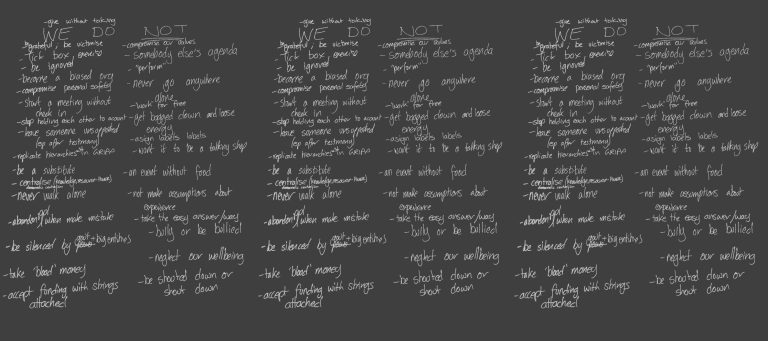At People Support Co-op we’ve been working with several organisations to introduce a radical approach to policy writing, as developed by our associate member Kiri Langmead. We call this the experience-based policy writing process because it involves identifying positive and negative past experiences of group members to explore how to create a policy that works for everyone and avoids replicating patterns of harm.
We recognise that members of collectives often resist the introduction of formal policies and procedures. This is understandable. After all, in hierarchical organisations, they are often used as a means to control workers and can become overly bureaucratic. However, whilst informal cultures and processes can support flexibility and openness to new ideas, they can also lead to informal hierarchies or other inequalities.
Examples:
“I’ve started to think that we need some written policies and procedures. Our first probationary members came to the end of their probation period last month and we didn’t have any way of deciding whether or not they had passed, or any idea of what to do if they hadn’t. It puts us in a really tricky situation.”
“One of our members went off sick last month and we didn’t have processes in place to support them. No one had a clue what to do!”
When written in an appropriate way, having clear policies can help to address these issues by providing a framework that guides practice and supports mutual accountability. In doing so, policies actually facilitate member control and support active and equitable participation in your organisation. They can also enable you to meet your legal obligations as an employer. As a member of one worker co-operative once said, written policies: “Create a kind of hierarchy that is otherwise missing. The most useful aspect of having a hierarchy is being able to say, ‘well this is what it says, this is what we need to be doing’ and you don’t have that in a coop apart from the rest of the group. If any one member is not accepting the voice of the rest of the group for any reason then it becomes very difficult, and if you have got your tool up there, your instrument saying ‘this is what it says’, it gives you something impersonal to battle with, to deal with”.
So how do we create policies without replicating the control and bureaucracy of capitalist organisations? There is no single answer to this question. How you go about writing policies and procedures, and what these contain, will depend on how your collective is run and what you want to achieve.
We offer below some of the underlying principles of the experience-based policy writing process, which we think are important to consider when writing policies and procedures in your organisation.
Underlying principles:
The process is as important as the outcome
The value of policies and procedure lies in the process of producing them, as much as the final product. Producing policies and procedures creates an opportunity for members to discuss challenging issues and share different approaches to working through these issues. It can also help to generate mutual understanding.
Values-based
A good starting point for any policy is your vision and values. What does your collective want to achieve and what are the values and beliefs that underpin this vision? Any policies and procedures that you write should align with and support your vision and values.
Produced in a way that reflects your wider ways of working and decision-making processes
For policies and procedures to be successful, you need to have buy-in from all members. Just like with any other decision this means involving members in decisions about what policies and procedures you need, and what you want these policies and procedures to achieve. This doesn’t mean that all members need to be involved at all stages – this would be overly time consuming – but it does mean checking-in with members at different points in the process. For example, you might seek agreement over the purpose of a policy at the start of the process, and then circulate a draft policy for members to provide feedback on. It’s helpful to think about how you can support everyone to have a voice in the process and address any inequalities to participation.
Viewed as open to change and challenge, at the time they are written and in the future
In hierarchical organisations policies and procedures are viewed as fixed documents that must be universally applied regardless of the circumstances or situation. If members feel that a policy is no longer working for the collective, discuss why and what you might do to address this.
Draw on experience
Take time to explore members’ past experiences of similar policies or procedures. If a member has had negative experiences, explore what made the experience negative and design your policy to avoid replicating this. If a member has had a positive experience, explore what made it positive and consider how you can reproduce similar positive experiences in your policy. Note that the sharing of experiences requires careful planning and facilitation, especially if you are discussing sensitive or negative experiences, or if the experience happened within your collective. This is where having an experienced external facilitator can be invaluable to carefully guide you all through the process.
Next steps
Make a list of any policies that you think would benefit your organisation and its members. Select the policy that you think is the most pressing and put aside some time in your next meeting to discuss it. The aim in this initial meeting isn’t to write the whole policy, or even to decide on all of the content. You might create a separate working group and a dedicated meeting to do that. Rather, the aim is to find out whether other members agree that this is an important and necessary policy to spend time on, and if so, what you want the policy to achieve.
When writing the policy, start with your values. Think about what each of your values means in relation to the policy, and what the policy needs to include (and exclude) in order to reflect your values. Thinking about your past experiences of similar policies, or talking to other similar organisations about the policies they have in place, can also help.
If you would like People Support Co-op to work with your organisation to help you develop a policy that works for your members, please get in touch with us: info@peoplesupport.coop




Comment on our forum: community.radhr.org